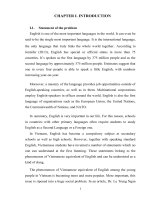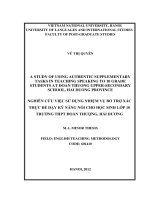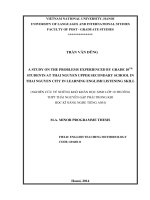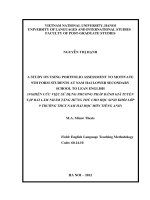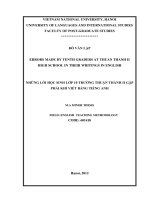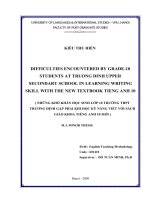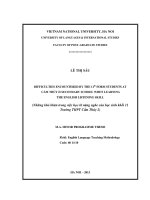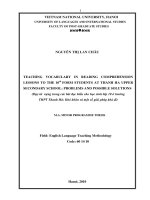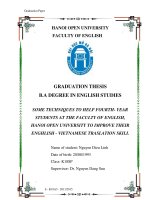Some methods help class 8d students at nhu ba sy secondary school improve their writing skills
Bạn đang xem bản rút gọn của tài liệu. Xem và tải ngay bản đầy đủ của tài liệu tại đây (185.75 KB, 17 trang )
INDEX
Title
Page
A. Introduction.
2
B. Problem solving
4
I.
Basis reality (Reality)
4
II.
Basis of theary.
4
III.
Solution
5
IV.
The tested results
15
C. Conclusions and recommendation.
Reference
17
20
A. INTRODUCTION .
1
Writing skills can be the ticket to better school grades and greater academic
achievement. This research introduces a few techniques for applying writing
skills to school success. But this good advice will be lost on you if you do not
believe writing skills are important and can help students achieve academic
mastery. My job is to convince you. To begin with, the overwhelming
majority of instructors we surveyed said that writing skills are critical to
academic success.
And if you see yourself as one of those secondary school students who will
say "Phew" when the syllabus reveals only exams and no papers, what
happens when those exams turn out to be essay tests? This article suggests a
few ways to raise students’ grade on those exams simply by employing the
principles of good writing even if students study no harder and know the
material no better than you do now.
Perhaps you've heard that no one cares about your grades once you leave the
halls of academia. While that notion holds some truth, it is equally true that
most potential employers do care about writing skills. They care so much that
they bemoan the poor preparation of the entry-level pool of grads. In a labor
force full of mediocre writers, someone who writes well is bound to stand out
and succeed.
Academicians and business people view writing skills as crucial, yet
increasing numbers of these professionals note a steady erosion in the writing
abilities of graduates. The summary of a study published in Personnel Update
states: "Writing skills ... of executives are shockingly low, indicating that
schools and colleges dismally fail with at least two-thirds of the people who
pass through the education pipeline coming out unable to write a simple
letter."
In 1988, Lin Grensing reported that 79 percent of surveyed executives cited
writing as one of the most neglected skills in the business world, yet one of
the most important to productivity. A 1992 survey of 402 companies reported
by the Associated Press noted that executives identified writing as the most
valued skill but said 80 percent of their employees at all levels need to
improve. The number of workers needing improvement in writing skills was
up 20 percent from results of the same survey in 1991. Results of a 1993
study by Olsten Corp., a placement agency, were almost identical: 80 percent
2
of 443 employers surveyed said their workers needed training in writing
skills.
Writing skills are an important part of communication. Good writing skills
allow people to communicate their message with clarity and ease to a far
larger audience than through face-to-face or telephone conversations.
They might be called upon to write a report, plan or strategy at work; write a
grant application or press release within a volunteering role; or they may
fancy communicating their ideas online via a blog. And, of course, a well
written C.V. or résumé with no spelling or grammatical mistakes is essential
if they want a new job.
Today, when anyone can be their own publisher, we see more and more
examples of poor writing skills both in print and on the web. Poor writing
skills create poor first impressions and many readers will have an immediate
negative reaction if they spot a spelling or grammatical mistake. As just one
example, a spelling mistake on a commercial web page may cause potential
customers to doubt the credibility of the website and the organisation.
We use language, both in its written and spoken form, in an attempt to
better communicate with those around us. The better a person is able to
speak, read and write this language, then the better they will be able to
communicate with others who use the same language to communicate. “Good
writing skills can make our material easier to understand, more respected, and
actually paid attention to. If you can't engage someone in what you are trying
to say, why do you think they would listen to you?” “Good persuasive skills
are also writing skills, and with this past election, we've seen how important
it is to get people to your side of thinking.” Without good writing skills,
grades could totally be affected. Term papers would not be written well.
People would more than likely be bored and not to listen to a word you said.
“More and more companies today are looking for Job applicants that have
good writing skills. The Instructors that were surveyed said that writing skills
are critical to academic success.”
with good writing skills, come good
communication skills. It is important for people to understand your thoughts
and ideas in a clear way. I have found that reading helps your writing skills a
3
great deal. Therefore, I have decided to choose “ Some methods help class
8D students at Nhu Ba Sy Secondary School improve their writing skills”
B. THE REASONS FOR THIS RESEARCH.
Anyone - whether they are an English teacher or student – will tell
themselves the four main skills they need to develop when learning a second
language are speaking, listening, reading and…writing. Naturally, learning
to speak the second language is often the priority. Listening is essential for
speaking, and students easily practice listening skills through movies and
songs. Reading is also a skill they may develop easily with the vast amount of
material available on the Internet. But writing is usually the skill that is most
poorly developed, nowadays only practiced in short emails, abbreviated chat
messages or some simple forms.
It is very easy to work on the first three skills in the English classroom,
but improving writing takes a real conscious effort both on our part and our
students’. This is the reason why I choose this top pic for my research.
C. THE CONTENTS.
I.Justification:
1. Teaching purposes :
The purpose of foreign language teaching is not only to provide students
with the knowledge of that language , but the ultimate goal of teaching
foreign languages in general and English in particular is helping students
gain the ability to communicate in English . The ability of students to
communicate through skills : Listening, Speaking , Reading and Writing .
English writing skills of students are formed through a process of academic
training in English environment . In addition to learning in the classroom ,
students have to study with different methods .
Writing is the ability to use language knowledge for the purposes of
writing in English .
2. The basic factors directly impact the effectiveness of the writing lesson .
a Teacher:
- With the new teaching method , teacher plays a positive role in directing
and controlling students in most classroom activities .
- To carry out an effective writing lesson, teachers should implement the
following basic elements :
4
1.View the improvement of students’ writing as our responsibility.
Teaching writing is not only the job of the English department alone. Writing
is an essential tool for learning a discipline and helping students improve
their writing skills is a responsibility for all faculty.
2. Let students know that we value good writing.
Stress the importance of clear, thoughtful writing. Faculty who tell students
that good writing will be rewarded and poor writing will be penalized receive
better essays than instructors who don't make such demands. In the syllabus,
on the first day, and throughout the term, remind students that they must
make their best effort in expressing themselves on paper. Back up your
statements with comments on early assignments that show you really mean it,
and your students will respond.
3. Regularly assign brief writing exercises in our classes.
To vary the pace of a lecture course, ask students to write a few minutes
during class. Some mixture of in-class writing, outside writing assignments,
and exams with open-ended questions will give students the practice they
need to improve their skills.
4. Provide guidance throughout the writing process.
After you have made the assignment, discuss the value of outlines and notes,
explain how to select and narrow a topic, and critique the first draft, define
plagiarism as well.
5. Don't feel as though we have to read and grade every piece of your
students' writing.
Ask students to analyze each other's work during class, or ask them to
critique their work in small groups. Students will learn that they are writing
in order to think more clearly, not obtain a grade. Keep in mind, you can
collect students' papers and skim their work.
6.Find other faculty members who are trying to use writing more
effectively in their courses.
Pool ideas about ways in which writing can help students learn more about
the subject matter. See if there is sufficient interest in your discipline to
warrant drawing up guidelines. Students welcome handouts that give them
specific instructions on how to write papers for a particular course or in a
particular subject area.
5
7.Remind students that writing is a process that helps us clarify ideas.
Tell students that writing is a way of learning, not an end in itself. Also let
them know that writing is a complicated, messy, nonlinear process filled with
false starts. Help them to identify the writer's key activities:
Developing ideas
Finding a focus and a thesis
Composing a draft
Getting feedback and comments from others
Revising the draft by expanding ideas, clarifying meaning, reorganizing
Editing
Presenting the finished work to readers
8.Explain that writing is hard work.
Share with your class your own struggles in grappling with difficult topics. If
they know that writing takes effort, they won't be discouraged by their own
pace or progress. One faculty member shared with students their notebook
that contained the chronology of one of his published articles: first ideas,
successive drafts, submitted manuscript, reviewers' suggested changes,
revised version, galley proofs, and published article.
9.Give students opportunities to talk about their writing.
Students need to talk about papers in progress so that they can formulate their
thoughts, generate ideas, and focus their topics. Take five or ten minutes of
class time for students to read their writing to each other in small groups or
pairs. It's important for students to hear what their peers have written.
10.Encourage students to revise their work.
Provide formal steps for revision by asking students to submit first drafts of
papers for your review or for peer critique. You can also give your students
the option of revising and rewriting one assignment during the semester for a
higher grade. Faculty report that 10 to 40 percent of the students take
advantage of this option.
11.Explain thesis statements.
A thesis statement makes an assertion about some issue. A common student
problem is to write papers that present overviews of facts with no thesis
statement or that have a diffuse thesis statement.
6
12.Stress clarity and specificity.
The more the abstract and difficult the topic, the more concrete the student's
language should be. Inflated language and academic jargon camouflage rather
than clarify their point.
13.Explain the importance of grammar and sentence structure, as well as
content.
Students shouldn't think that English teachers are the only judges of grammar
and style. Tell your students that you will be looking at both quality of their
writing and the content.
13.Ask a composition instructor to give a presentation to the students.
Invite a guest speaker from the composition department or student learning
center to talk to your students about effective writing and common writing
problems. Faculty who have invited these experts report that such
presentations reinforce the values of the importance of writing.
14.Let students know about available tutoring services.
Individual or group tutoring in writing is available on most campuses. Ask
someone from the tutoring center to give a demonstration in your class.
15.Use computers to help students write better.
Locally developed and commercially available software are now being used
by faculty to help students plan, write, and revise their written work. Some
software available allows instructors to monitor students' work in progress
and lets students collaborate with their classmates.
16.Ask students to write what they know about a topic before you discuss
it.
Ask your students to write a brief summary of what they already know or
what opinions they hold regarding the subject you are about to discuss. The
purpose of this is to focus the students' attention, there is no need to collect
the summaries.
17.Ask students to respond in writing to questions you pose during class.
Prior to class starting, list two or three short-answer questions on the board
and ask your students to write down their responses. Your questions might
call for a review of material you have already discussed or recalling
information from assigned readings.
7
18.Ask students to write from a pro or con position.
When presenting an argument, stop and ask your students to write down all
the reasons and evidence they can think of that supports one side or the other.
These statements can be used as the basis for discussion.
19.During class, pause for a three-minute write.
Periodically ask students to write freely for three minutes on a specific
question or topic. They should write whatever pops into their mind without
worrying about grammar, spelling, phrasing, or organization. This kind of
free writing, according to writing experts, helps students synthesize diverse
ideas and identify points they may not understand. There is no need to collect
these exercises.
20. Have students write a brief summary at the end of class.
At the end of the class period, give your students index cards to jot down the
key themes, major points, or general principles of the day's discussion. You
can easily collect the index cards and review them to see whether the class
understood the discussion.
21. Have one student keep minutes to be read at the next class meeting.
By taking minutes, students get a chance to develop their listening,
synthesizing, and writing skills. Boris (1983) suggests the following:
Prepare your students by having everyone take careful notes for the class
period, go home and rework them into minutes, and hand them in for
comments. It can be the students' discretion whether the minutes are in
outline or narrative form.
Decide on one to two good models to read or distribute to the class.
At the beginning of each of the following classes, assign one student to take
minutes for the period.
Give a piece of carbon paper to the student who is taking minutes so that you
can have a rough copy. The student then takes the original home and revises it
in time to read it aloud at the next class meeting.
After the student has read their minutes, ask other students to comment on
their accuracy and quality. If necessary, the student will revise the minutes
and turn in two copies, one for grading and one for your files.
22. Structure small group discussion around a writing task.
For example, have your students pick three words that are of major
8
importance to the day's session. Ask your class to write freely for two to three
minutes on just one of the words. Next, give the students five to ten minutes
to meet in groups to share what they have written and generate questions to
ask in class.
23. Use peer response groups.
Divide your class into groups of three or four, no larger. Ask your students to
bring to class enough copies of a rough draft of a paper for each person in
their group. Give your students guidelines for critiquing the drafts. In any
response task, the most important step is for the reader to note the part of the
paper that is the strongest and describe to the writer why it worked so well.
The following instructions can also be given to the reader:
State the main point of the paper in a single sentence
List the major subtopics
Identify confusing sections of the paper
Decide whether each section of the paper has enough detail, evidence, and
information
Indicate whether the paper's points follow one another in sequence
Judge the appropriateness of the opening and concluding paragraphs
Identify the strengths of the paper
Written critiques done as homework are likely to be more thoughtful, but
critiques may also be done during the class period.
24.Use read-around groups.
Read-around groups are a technique used with short assignments which
allows everyone to read everyone else's paper. Divide the class into groups no
larger than four students and divide the papers (coded for anonymity) into as
many sets as there are groups. Give each group a set and ask the students to
read each paper silently and decide on the best paper in the set. Each group
should discuss their choices and come to a consensus on the best paper. The
paper's code number is recorded by the group, and the same process is
repeated with a new set of papers. After all the groups have read all the sets
of papers, someone from each group writes on the board the code number
from the best paper in each set. The recurring numbers are circled. Generally,
one to three papers stand out.
9
25.Ask students to identify the characteristics of effective writing.
After completing the read-around activity, ask your students to reconsider
those papers which were voted as excellent by the entire class and to write
down features that made each paper outstanding. Write their comments on the
board, asking for elaboration and probing vague generalities. In pairs, the
students discuss the comments on the board and try to put them into
categories such as organization, awareness of audience, thoroughness of
detail, etc. You might need to help your students arrange the characteristics
into meaningful categories.
b. Students:
In the relationship between teaching and learning : Teachers who organize,
control students to actively gain the knowledge to dominate the actions of
their own intellectual role .
To have good writing skill , students should have the following necessary
tragedies in English writing lesson .
1.Understand the task.
Say the words “writing assignment”, and we will most likely hear students
groan. Writing is a chore. It’s hard work. And we shouldn’t deceive them by
saying it will be fun. Writing is a skill that must be honed through practice.
But why would they put in the hard work? What’s their motivation?
It’s easy to find it in Business English students. Most need to write business
emails and texts. But what about teens and young learners? In these cases,
you’ll need to convey the importance of good writing skills. It is essential for
them to know how to communicate, not only in speaking, but in writing. And
we must make it clear that sending a text message in English does not
constitute good writing. Writing is a skill that will prove to be tremendously
helpful in the future and they must understand that.
2.Schedule regular writing assignments
Teachers often also prioritize the other skills above writing. It is harder to
teach and more time-consuming to correct. Make sure to give students
schedule regular writing assignments every month - we may choose to make
it once a week, once a month, or at the end of a unit.
10
3. Ask for clear instructions.
Needless to say, in most English classrooms, simply saying, “Write a story
of 100 words” will not suffice. The extent of our guidance should be
proportional to our students’ level. The lower the level, the greater the
guidance. As they advance in their English studies they will need less and
less guidance, till one day they become more independent writers.
For beginners, it’s a good idea to start with short writing prompts or
sentences they have to complete. Then, we make the prompt more of a
general idea about what they should write, rather than just a sentence: “What
would you do if you won the lottery”. Here we expect them to write several
sentences using the second conditional. Finally, they will be ready for more
creative, free writing.
At first, they need providing opening and closing expressions for letters. We
need
to
instruct
them
on
structuring
their
texts
into
paragraphs: introduction, supporting paragraphsand closing. We may even
include some phrases they have to use somewhere in their text.
Hand out templates, bibliography, writing style guides and anything they can
use to help them in their writing. Soon enough, they won’t need the
templates anymore.
4. Use peer correction
In some levels – and particularly in Business English students – they may
choose to have teachers correct each other’s writing assignments. This
way, you won’t have piles of papers to correct, but they will also learn from
each other’s mistakes. Go around the classroom, supervise and answer
questions.
5.Revise their work
Did someone misinterpret the task? Did a student make too many
mistakes? Ask them to revise their work and give them the chance to submit
it again. Make sure they understand this is not punishment for turning in
11
poor quality work, but rather a chance to learn from mistakes and make
improvements on their writing.
6.Make it a positive experience
Try to offer two pieces of praise for every negative point: “Maria, you
used great vocabulary and your punctuation is excellent. Now you need to
work on using the right verb tenses.” By mentioning the things they did
right, no matter how small they may seem, we let them know they are on the
right path. Pure criticism and a paper full of red marks will not encourage
them to continue practicing!
Show them how useful learning to write in English can be. For speaking they
have to think quickly, but in writing they have more time to gather their
thoughts and organize ideas. Practicing writing can also do wonders for their
speaking!
II.The situation of carrying out writing lesson in Nhu Ba Sy Secondary
School.
1.Positive sides.
English teaching is becoming more and more important and considered to be
one of the most necessary subjects. Most students love learning English and
they long to have good ability and English skills.
a. Teacher:
The English teachers at Nhu Ba Sy School are quite good , they can meet
most students’ need and society demand.
b.Students:
Most students love learning English and they think that they will be out of
work, their future will be not very good if they do not have good English.
They are very intelligent and keen on studying.
2. Drawbacks.
There are too many students in each class that makes teachers find it difficult
to control every classroom activity.
3.A writing lesson sample.
Unit 2:
Period 14:
LIFE IN THE COUNTRYSIDE
SKILLS 2
12
I. Teaching points:
- By the end of the lesson Ss can:
+ listen for specific information about changes in the countryside.
+ write a short paragraph about a changes in the countryside.
II. Content:
- Vocab:life in the countryside
III. Preparations:
- Materials: Ss’ books, text books, tape & radio.
- Method: T- WC, group work, individual work
IV. Procedures:
Teacher and Students
Board & contents
I, Warm up: Brainstorming
Life in the countryside
- Ask Ss to talk about their likes
and dislikes in the countryside
II, Pre-listening:
- Give Ss some questions:
III, While-listening:
- Give Ss time to look at the
changes. Ask questions to make
sure that Ss understand the
meanings of the words/ phrases.
- Play the recording again to
check the answers.
- Ask Ss to read the sentences
and play the tape again.
- Get Ss to give the answer
- Ask Ss to read the questions
first to see what kind of
information they need to find
and give their answers.
- Check Ss’answers.
IV, Pre-writing:
- Remind Ss of the changes in
the village from the listening
passage. T can help by writing
the changes in brief on the board
as a guide for the writing
exercise.
V, While-writing:
- Place Ss into small groups of
three or four.
+Questions for discuss:
+ Do you live in the village or in town?
+ Are there any changes in your home village
nowadays?
1. Listen to a boy talking about changes in
his village and tick () the changes he
mentions.
Key:
- B, C E, F
2. Listen again and say if the sentences are
true or fasle.
Key:
1. F 2.T
3.F
4.T
5.T
3. Listen again and answer the questions in
no more than Four words.
Key:
1. His parents
2. Life outside their village
3. Nearby/ Near the village
4. A nomadic life
4. What do you think? Which changes in the
listening do you see as positive? Which do
you see as negative? Support your opinion
with a reason. Write it out.
- earthen houses -> brick house
Example:
It’s good for the villagers to have TVs. They
can now have more fun and learn more about
different people and different places.
5. Work in groups. Discuss and find some
changes in a rural area. Make notes of the
changes.
13
- Ss in each group work together
to decide which rural area they
will talk about. Then they
discuss and note down some
changes they can find in this
area.
VI. Post –writing:
- Call some good students to
show their writing before class.
VII. Homework
- Ask Ss to rewrite and reread
their writings.
6. Write a short paragraph about the
changes.
Suggested:
- The first change is…..
- The change we are most interested in is…..
- Read their writing out loud before class.
VII. Homework
- Ask Ss to rewrite and reread their writings.
Write - free ( Free writing )
Apply for the class are more strong students , students with high
creativity , but to all students participating in activities good creative writing
teachers have to design for the exercise creative hon.Ket results reworked for
a more creative exercises not only help the teachers in their writing process
taught his students that Gv also self- learning and enhance their level .
To make good writing skills , good teachers should do the tutorial sample
through reading assignments and detection , then request the article explains .
Need to clarify the situation and request the article, should give hints if
needed . To make good the clue , should exploit the opinions of the class or
group before the individual student nhan.Voi a number of posts, be able to
build over the previous speech , then students write individual personnel .
Any write operation on all have strengths and weaknesses . Especially guided
writing activities , operational strengths are feeling confident for students
because the level of simple exercises , creating opportunities for students to
practice writing . Being familiar activities of teachers of teachers should treat
fast , compact , saving students time and also less error , creating
opportunities for students to practice writing different genres . Weakness is
dull for strong students , some teachers do not like because it's not creative ,
so teachers must be prepared to add some other writing activities have higher
requirements for students good and excellent .
IV results are :
14
Through the experimental lessons , supervises colleagues have found
that the application of the method to the written lesson made less boring
lesson , students actively in learning more , so excited passions the subject is
raised ret.nhung clearly weak and average students confident and excited to
solve tasks in guided writing activities , strong students advanced knowledge
in the operation once more in the works skillfully written instructions . In the
2018-2019 school year ; Quality of English 2018-2019 block 9 is raised ,
some strong students increases, the number of poor students decreased
compared with the results of the first survey.
V. SOME LESSONS LEARNED :
Through a lot of lessons to study , learn and colleagues hour weather
forecast , I noticed that : To achieve high results in the teaching of English
teachers first must be responsible , have enthusiasm , love my job , love
children , said investors prepared for all lectures as well as quality , to clearly
define the purpose and requirements of the central lesson , know how to use
and incorporate flexible , innovative teaching methods consistent with typical
school subjects , with specific lesson content , to suit each student audience ,
a good combination of the right method of teaching and learning activities .
Besides, we should always flexible alternative operating procedures that we
often use in the skill lessons with new operating procedures have fun learning
to count coated repeated the misleading extinguishing in students .
Teachers know the exploit , and use a good combination of media , teaching
equipment such as projectors , pictures , share , tag , and create real object
diagram aesthetic content and high technical help students excited to acquire
knowledge firmly and practice the skills of listening, speaking , reading,
writing competently meet the requirements set forth by the department .
VI.Conclusion
Like the issue of grammar , vocabulary and other language skills ( speaking
listening, reading ) , writing is an integral part of the learning process ,
learning and language use .
In the process of learning to write , students practice writing through writing
exercises from a piece written standards to replace some of the components
15
in question , in writing , to writing about the topic control , pieces sentences ,
vocabulary , .. until the complete freedom to write , on the basis of student
creativity .
A writing lesson is divided into 3 steps as well as the lessons khac.pre writing skills , while - writing , post - writing.GV need to apply for specific
activities , appropriate to correct the internal phase and each post certain
content .
There are many tricks to proceed in teaching writing skills , the task of the
teacher depending on the specific qualifications of the students, said flexible
use of various tricks to achieve the end goal together to help students
integrate the knowledge learned in the writing skills most effectively .
Each stage has taught writing for different purposes so teachers need to use
different types of procedures and in accordance with their students to achieve
the highest effective teaching .
On the basis of determining the basis of theoretical analysis of the advantages
and disadvantages of teachers and students in the process of teaching writing
skills in English Anh.Toi subjects were assigned to apply flexible methods
and tricks to help school improve student writing skills in particular and
improve the quality of English in general . Through the testing process in
block 9 PhuongTra secondary school , I have seen students progress , lessons
take place gently , naturally , the children participate in activities
hardworking , enthusiastic , emulation , by it is highly effective . Thus the
measures proposed to ensure proper implementation of the spirit and renew
books instead of teaching methods .
In the spirit of diligent research and draw their own experience , humility to
learn from peers and the older generation , I bravely research topics ;
" Experience teaches English writing skills in grade 9 ." However, measures
are always tools , new human factor is decisive namely : love craft , love of
teacher enthusiasm tre.su and diligence of students will make a success of
teaching hours .
These are just some of the methods that I used when teaching writing skills ,
the methods that were somewhat successful in bringing teaching hours .. The
16
most important thing is the teacher must have the mind , always enthusiastic
teaching , finding methods to indoctrinate students in an understandable way
most open and friendly with their students to see language learning as fun has
just come in handy . I encourage and test them . Promoting the ability to
share in group activities in the early hours of 15 minutes . The weaker
students , poor students are assigned to good and excellent tutoring help .
C . Recommendations :
Suggest mounted projectors in school classrooms to facilitate more stable for
teachers .
Armed with more reference books , enhanced books for English teachers and
students .
I sincerely thank you!
CONFIRMATION OF THE
HEADMASTER
Thanh Hoa, May 8 th, 2019
I assure this is my own initiative experience. I
do not copy the other people's content.
(Name and full name)
Pham Ngoc Thanh
REFERENCES
1. Students’ and teacher’s 7 English Program Pilot books.
2. Brown, H.D. (1994). Teaching by Principles: An Interactive Approach to
Language Pedagogy. Englewood Cliff, NJ: Prentice Hall.
3. Byrne, D. (1978). Teaching Oral English. Longman, London.
4. Lee, W.R. (1979). Language Teaching Games and Contexts. 21 Oxford
Press.
5. Rixon, S. (1981). How to use games in language teaching. Macmillan
Education
17
